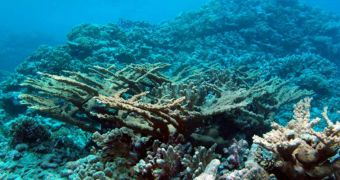While diving in the waters around the Arno atoll in the Marshall Islands, experts managed to recently discover a new reef of the world's rarest corals. The Pacific elkhorn coral (Acropora rotumana) stands out from other species through the fact that, as it grows, it branches off like an elk's antlers, giving it a unique, distinct appearance, LiveScience reports.
“When I first saw it, I was absolutely stunned. [The corals] were like nothing I'd seen before in the Pacific Ocean,” explains Zoe Richards. The scientist is the leader of the research team at the Center of Excellence for Coral Reef Studies (CoECRS), which is based in Queensland, Australia. The huge coral colonies, the scientist adds, were as large as 5 meters (16 feet) across, a 2 meters (7 feet) high. Discovering such reefs is a very rare finding, which makes the recent breakthrough all the more important. The Marshall Islands, a Micronesian nation of atolls and islands, are located in the middle of the Pacific Ocean.
“So far I have only found this new population of coral to occur along a small stretch of reef at a single atoll in the Marshalls group. It grows in relatively shallow water along the exposed reef front and, so far, fewer than 200 colonies are known from that small area,” Richards explains. He adds that the rare reefs he stumbled upon here are the first ones of their kind to be discovered in more than 100 years. Despite being mistakenly identified as a single organism, a coral reef is in fact an accumulation of many corals, which are in fact very tiny organisms. They only create the illusion of forming a larger entity, experts say.
“When Zoe showed me pictures of the Pacific elkhorn, I was shocked. The colonies look just like the critically endangered Caribbean species A. palmata, one of the most distinctive of all corals. The fact that these colonies might represent a species that has not been seen for over a hundred years (A. rotumana) says something about how much we know about the remote reefs of the North Pacific,” says CoECRS coral geneticist David Miller. A. palmata is a now-rare species of Caribbean corals, which are now classified as critically endangered, having already disappeared from most of its original habitat.

 14 DAY TRIAL //
14 DAY TRIAL //